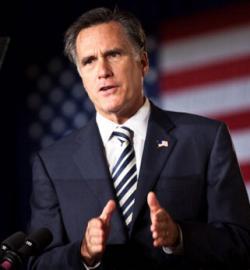Last week resolved the remaining questions about which Republicans are running for president. Chris Christie, the outspoken governor of New Jersey, and Sarah Palin, the misspoken conservative celebrity, won’t. The field is now set and pointed toward a somewhat surprising outcome. In the most conservative moment the United States has experienced in decades, a party dominated by Tea Party radicalism is on course to nominate the mild and moderate Mitt Romney.
In the interminable staged debates that punctuate the primaries, Romney stands above a quarrelling chorus of patriotic anarchists: Rick Perry, the gallows-loving governor of Texas; Ron Paul, the ascetic libertarian; Herman Cain, an African-American pizza magnate; Rick Santorum, who appeals to the religious right; and Michele Bachmann, who appeals to late-night talk-show hosts in search of material. Newt Gingrich, abandoned by his own staff, remains irrelevantly in the race. So, too, does Jon Huntsman, who has great appeal, but not to any actual Republican voters. These seven dwarves continue to run against Romney while Romney runs against President Obama.
There is sure to be more drama before it’s settled, if only because the media can’t tolerate a stagnant race. But the GOP nomination is now Romney’s to lose, and there’s no obvious reason why he should. That he has emerged as the nominee-apparent before any votes have been cast is tribute to the Tea Party’s failure to rally around an alternative and to Romney’s strength in relation to a faltering Obama.
To the disappointment of both radical conservatives and Obama liberals, the former Massachusetts governor is a sane, intelligent, and reasonable man. Unlike some of his rivals, he is not hostile to undocumented migrants or homosexuals. He doesn’t deny the facts of climate change or evolution. He isn’t proposing vast tax cuts or reductions in social spending. Romney’s politics express the worldview of a successful businessman who became the technocratic governor of America’s most liberal state.
When he ran against John McCain in 2008, Romney swung too far and too fast from his Massachusetts persona and came across as not just pandering but incoherent. This time around, he has given up being anyone’s first choice and striven to become everyone’s second. His strategy has been to make himself tolerable to the Tea Party while developing positions with an eye toward the general election.
Romney made this approach clear in May when he declined to disown the universal health care plan he championed in Massachusetts. This plan, based on a requirement that individuals buy insurance with the help of subsidy, is essentially the same as Obama’s Affordable Care Act done at the state level. Arguing that Obamacare is procedurally rather than substantively wrong is tricky, but disowning his chief accomplishment would have been disastrous.
In other areas like abortion and immigration, Romney has simply reversed his prior positions. He can do this readily because he is, like Obama, a thoroughgoing pragmatist. One can cast this flexibility as insincerity or lack of principle, but in truth it is simply the problem-solving mind-set of the management consultant and corporate turnaround artist Romney was before he entered politics. Faced with a new competitive challenge or evolving consumer preferences, the shrewd businessman swiftly adapts.
In moving from the liberal Massachusetts market to the ultra-conservative Republican primary one, Romney has faced a daunting challenge in rebranding. Being pro-choice on abortion, supportive of gay rights, lenient on immigration, and concerned about climate change were views that helped him gain a market share a decade ago. In the 2008 presidential election, he replaced those positions too precipitately with a new product line, spawning a consumer backlash. In 2012, he is positioning himself somewhere between the Romney of 2002 and the Romney of 2008.
This managerial malleability alarms Tea Partiers, but it should come as a relief to everyone else. Romney is not a radical and will not govern from the far right, unless the country has truly gone there first. And when the time comes for him to behave responsibly, he will have less trouble than his rivals might in accepting the necessity of higher taxes. For those interested in the economic choices that America’s next president will face, Romney’s nonideological nature is a significant plus.
The greatest risk he faces in both the primaries and as a potential candidate against Obama is becoming a Republican John Kerry. Romney doesn’t suffer from Kerry’s pomposity or tin ear, but he courts mockery by looking and sounding too much like the product of focus-group testing. He lacks humor and spontaneity. While few detest him, no one outside of Romney’s equally flawless family can be said to love him.
Obama’s team faces the choice of whether to depict Romney as an extremist in mufti or a flip-flopper, which was how the 2004 Bush campaign devastatingly defined Kerry. The problem with the first line of attack is that it isn’t true. The problem with the second is that it may be Romney’s greatest advantage.
This column also appears in the Financial Times.
